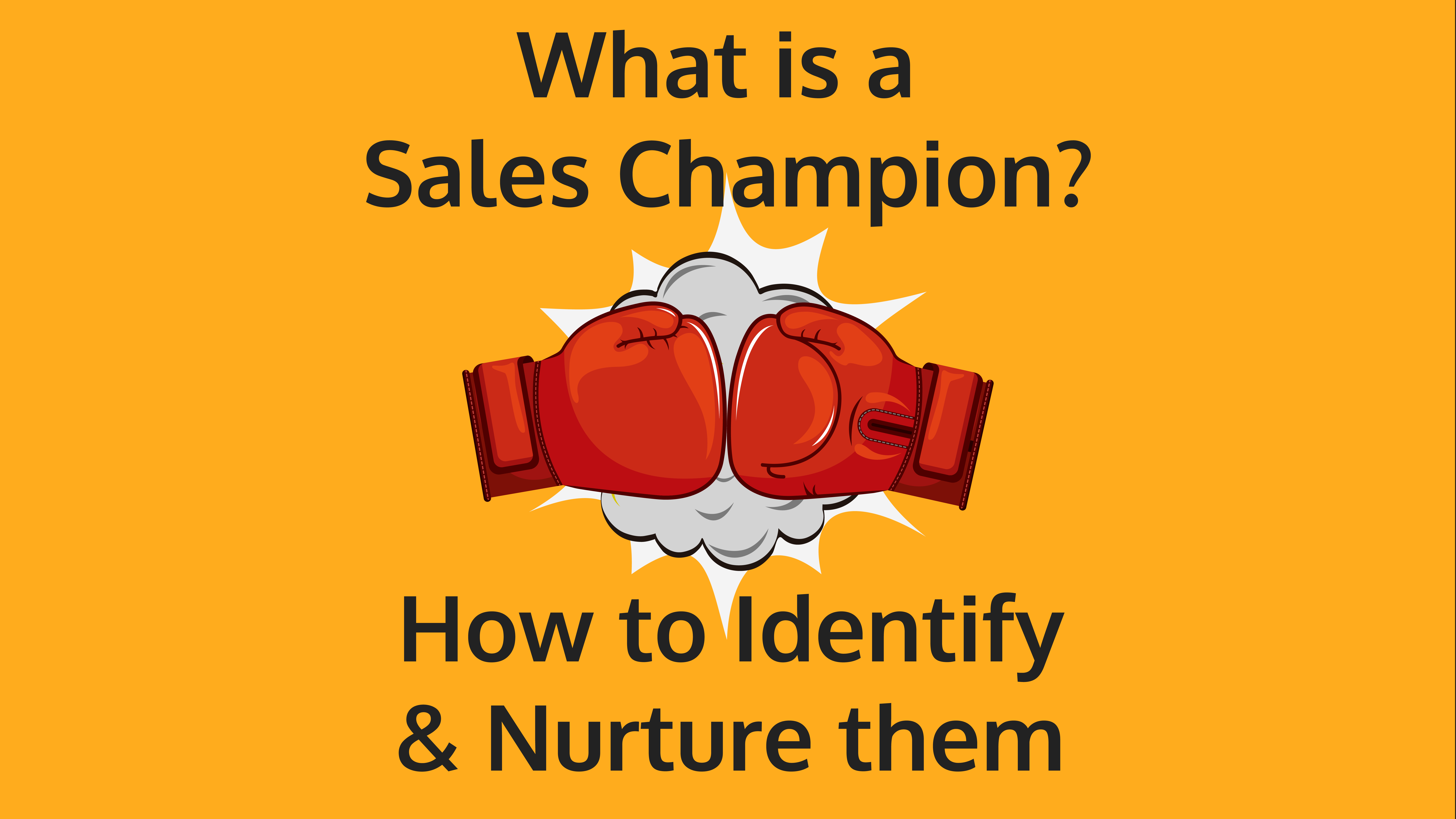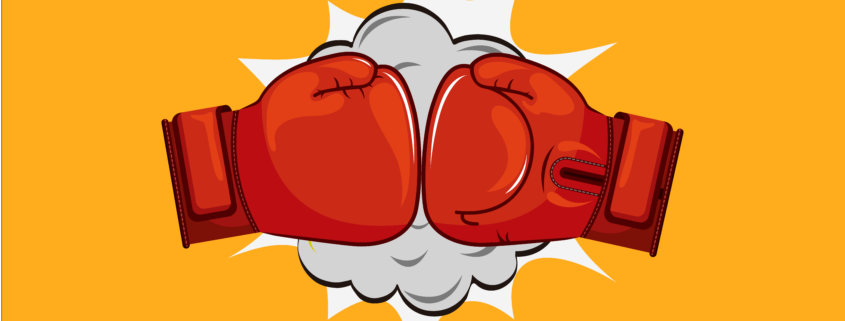What is a MEDDIC Sales Champion? How to Identify and Nurture Them | MEDDIC | MEDDICC | MEDDPICC
A MEDDIC Sales Champion is the person within your client’s organization who will sell on your behalf when you’re not there. They will guide you through the decision making process, introduce you to key players and decision makers, and alert you if things go wrong.
We’ve talked about how to discover real pain points – ones that will drive customers to take action. Today, we want to share more about Sales Champions and how they have the ability to be the driving force behind the projects that will solve these pain points. They are probably the most important people in your sales campaign, and they’ll fight hard for your cause.
Today we’ll take you through:
- The Power of a Sales Champion
- How to Identify a Sales Champion
- How to Spot Your Sales Champion When You Meet Them
- How to Develop a Strong Sales Champion
- How to Be Sure if You Have the Right Sales Champion
Also, at the end of the blog, don’t forget to download our Free PDF Champion Qualification Checklist!

The Power of a Sales Champion
A few years ago, I was working on a very large opportunity. We had a unique offering and were convinced that we had a good chance to close the deal. Pretty late in the cycle, I got the following text message from the VP of Operations at our client’s organization:
“Rizan, l’m in a board meeting right now. Other members are leaning towards your competition, who says they can do the same for less money. They are coming in 1 hour to present. Ideas? – Paul“
I felt my pulse rising. We have been working too hard on this account and now it almost seems like we were on the verge of losing? I couldn’t let that happen. So I immediately called up my product-marketing guys and asked them for everything they knew about the competition’s offering. They hastily sent me the information and I texted Paul back.
With two well-placed questions that highlighted the pitfalls of going with the competition, he knocked the competition out of consideration and convinced the board to go with us. 6 weeks later, we signed a deal worth $3.7 million. If it hadn’t been for Paul, we would have probably lost the deal (or closed it with a huge discount, which meant less revenue for us).
The important thing to note is that he didn’t just send me a text out of nowhere. He and I had been working together for months to make this deal happen. In other words, I had been enabling and nurturing Paul to become this deal’s Champion.
Like Paul, a Sales Champion informs you the moment things go wrong, which gives you the opportunity to react in time. They give you insight and guidance on how to best run your campaign and influence the internal decision making process.
Without a solid Sales Champion, understanding your client’s pain and accessing the key decision makers become much more difficult. Great salespeople know that and actively look for allies within their prospects whom they can nurture to become champions.
The question is, how do you find a Champion, and, more importantly, how do you convince them to support you?
How To Identify a Potential Sales Champion
From the moment a lead turns into an opportunity, you need to start searching your account’s organization for the right Sales Champion. But where do you start? There are two main characteristics to look out for in a Sales Champion:
1. Sales Champions have a personal interest to drive your deal
In order for a Sales Champion to be motivated to help you, they must have a personal benefit. They most probably directly suffer from the pain you have identified or have been assigned by management to solve it.
2. Sales Champions have power and influence to drive your deal
The person helping you through the fog of decision-making, introducing you to the right people must be a well-positioned, respected and connected individual.
Let’s to go into each characteristic in detail:
Your Sales Champion’s Personal Interest
Discovering the personal interest of your Sales Champion is in many ways crucial to the success of your campaign. It allows you to understand the personal motivation behind solving a pain.
Personal interests could be:
- Goal oriented: To achieve something like beating an internal competitor, a promotion, recognition by their department or monetary incentives.
- Driven by fear: Preventing a job loss, competitive pressure, budget cuts or pending reorganization ideas.
The key question is: Does this person have something to gain if we close?
Since there is a personal element involved, it’s not always easy to ask direct questions about what’s in it for their own interest. If you have earned their trust by showing potential solutions to his or her pain point, Sales Champions will usually open up, allowing you to discover their personal motivations.
For example, a Sales Champion I once worked with wanted to spend more quality time with his family. However, his company’s software was forcing him to come into the office on weekends to manually troubleshoot the system. When I was able to show him that our solution would automate that for him, he was sold. He ended up becoming the main driver behind that deal.
Serving your champion’s personal interest generates allies within your prospects – a defender of your joined cause. They will become emotionally involved helping you clinch the deal so that their personal goals can be achieved. As a result, they will stand up and fight for this project and protect it against budget cuts, competition, delays and other elements not in your favor.
Does your Sales Champion have Power and influence?
While identifying your champion’s personal interest is critical in building bridges, you also have to ask yourself: Does this person have the necessary power and influence to drive changes to help close this deal?
In my first year as a salesman, I was selling access control software at a large telecom provider and my Sales Champion, Peter, was a senior manager of large server systems. The exposure my prospect had on their Unix system was huge and the pending integration of business partners made it even larger. They had a huge pain and we were a perfect fit, which we proved in a POC.
Peter’s personal interest was to secure the landscape and he had promised us to get the deal. We had a perfect campaign, but when it came to closing the deal, it hit a snag. After weeks and months of waiting, he finally informed me that my prospect had decided to go with another solution.
After the initial shock, I investigated and found out that Peter had a very weak standing within the IT department. On top of that, the CIO had actually delegated the project to Peter’s internal competitor.
Long story short: Peter had no power and influence.
This killed my deal. BUT it taught me a valuable lesson to be extremely certain that my potential champion actually has the power and influence to drive the deal.
Check out the video below as former Senior Sales Operations Manager at TrustRadius, Alex de Mocskonyi, shares more on how identifying the Champion in your account is crucial to driving meaningful conversationw, and how he uses iSEEit on Salesforce to visually map out the champions in his account.

So, How Can You Spot Your Sales Champion When You Meet Them?
By the way they challenge you
They usually have strong characters and don’t trust anyone easily from the beginning. They tend to stay in the back during presentations. However, they will get engaged and might even challenge you if they become interested.
By the way others interact with them
Since they are very well-respected, people listen when they speak. Senior managers often delegate questions to them or ask for acknowledgement.
They can answer questions about business implications
As they are well-connected, they usually have the bigger picture in mind and can see how their work relates to other departments.
They know who to involve up the chain
They either have a leading role or have informal channels to the top management.
How to Develop a Strong Sales Champion?
After you have identified and qualified a potential champion you know who you want to work with, but does this person accept you as someone who can help solve their issues.
In most cases you will need to build credibility and earn the right to call him a champion.You can nurture your potential champion by focusing on their success. You can do this by sharing deep dive information they need about the topic, give insights on successful implementations at other clients or connecting them to a subject matter expert in your company to discuss the topics on a deeper level.
Everything you give them to solve their problems easier and faster will make you earn their trust and respect.
How Do You Know if You’ve Got The Right Champion?
Once you have earned the right, you can test your champion by asking for something in return.
It could be something small, like asking for a piece of information you need to plan your campaign. It could also be something a little bigger like arranging and planning the next steps(e.g. a demo with the extended team or a meeting with the Economic Buyer).
You’ll know you’ve found a true Sales Champion when you’ve got someone returning your calls or even proactively reaching out to you. They will actively discuss next steps with you, and share inside information.
They will give you access to other key stakeholders who need to be involved in the decision making process.
Most importantly, they will be the first to alert you when things go wrong.
A word of warning…
Merely liking you or your product doesn’t immediately make someone a Sales Champion. To make sure you’ve got someone you can rely on, test their power, influence and the alignment of the solution to their personal interest to be sure you have somebody “selling” on your behalf.
Conclusion
Based on my experience, I can definitely say: No Champion, no deal.Without a Champion to help you drive your deals proactively, you won’t have the support you need to beat your competitors. By making sure you identify and build multiple champions that guide you through the buying process, you ensure that you build the most solid base for your deal as possible.
Click here to find out how Sales Champions play a part in the MEDDICC sales qualification methodology.
Get a Free PDF Champion Qualification Checklist here!
Like promised before, when you click on the link above, you will get access to a free PDF Champion Qualification Checklist.
Get a Free PDF Version of This Guide
If you’re ready to boost your sales using the strategies listed in this post, then I’ve got something special for you:
A free downloadable PDF version of this very guide.
Click the link below and enter your email to get the entire post PDF:







Leave a Reply
Want to join the discussion?Feel free to contribute!